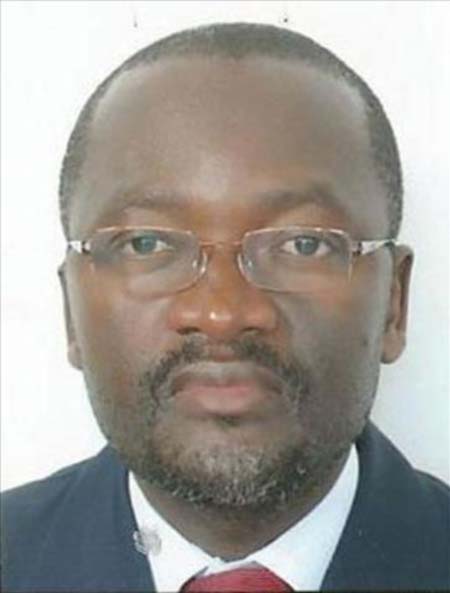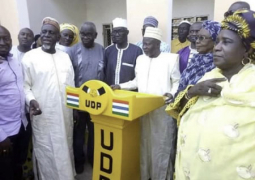
The former minister was continuing his evidence-in-chief on Thursday 16 July 2015, before Justice Abi of the Banjul High Court.
When the case was called, the trial judge delivered a ruling on the admissibility of a letter sent to the Ministry of Foreign Affairs, which the defence applied to tender in evidence as part of their case while the state objected.
Justice Abi, however, after listening to the argument from both sides, said he could not admit the letter.
Continuing his testimony, Ousman Badjie said on 22 May 2014, he received a police interim report and called a court in Paris to seek for legal advice.
He explained the matter they were faced with, and told them he was seeking for legal advice on which action to take.
They referred him to a legal expert on financial and monetary issues, who gave them an appointment.
He went with the deputy head of mission to meet with the legal expert, and narrated the story.
The expert took note of their explanation and gave them another appointment, and asked the deputy head of mission to bring other official documents where she signed on behalf of the embassy and a copy of the forged cheque.
“On 1 July 2014, I went to meet the expert with the deputy head of mission and the protocol welfare officer of the embassy. The expert told us: ‘I am going to be honest with you. Looking at the documents Mrs Sock is signing and the copy of the alleged forged cheque signature, I have not seen any difference between the two. As such, under the French Financial and Monetary Act, it will be very difficult for the embassy to get something from the bank’,” he said.
Badjie further said he used the embassy’s letterhead to write to the bank that he was disappointed in them, because it was not the habit of the embassy to cash a cheque for that amount, and that the bank did not even bother to call the embassy to ascertain whether it was authorised by the embassy, and that he lost trust and confidence in them.
He said the bank replied acknowledging his letter, and said their investigation showed that the signature on the alleged forged cheque was not different from the one with the bank as specimen, and that Faisal was one of the signatories to the account and the one presented to them as the Financial Attaché.
Ousman Badjie said he addressed the letter to the permanent secretary at the Ministry of Foreign Affairs, adding that he narrated the incident as it happened quoting the report from the deputy head of mission dated 20 February 2013.
He said the report of the deputy head of mission was addressed to the Director of National Treasury in accordance with Financial Instructions 341.
He added that, as an ambassador, he was not an accounting officer and he could not be an accounting officer.
He said the accounting officer is the deputy head of mission/head of chancery.
He said that in that same letter, he gave the PS the rundown of the incident saying he went to the bank to find out and then to the police to officially report the matter; then went back to the office to write the verbal note to the French Ministry of Foreign Affairs, informing them of the incident at the embassy and that the matter had been reported to the police.
He, therefore, solicited the directors’ cooperation on behalf of the Gambia Government, to strip Faisal Bojang of his diplomatic status and arrest him whenever he would appear.
He said in concluding his letter to the PS, he recommended that he should tell the Director of Treasury to report the matter to the Interpol office at the police headquarters in Banjul.
He said on 12 March 2014, he wrote another letter to the PS, following a meeting he had with the commissioner of police in Paris to enquire the progress of the investigations.
“I told the PS that my meeting with the commissioner did not give any clue as investigations are still ongoing, and that Faisal is yet to be seen.”
When the said letter was shown to him in court, he identified it, and the defence applied to tender it in court.
The letter was tendered in court and marked in evidence as exhibit without any objection from the state.
He further adduced that the commissioner also stated that they wanted to interview Mrs Sock, because she told them her signature was forged.
He said he told them that Mrs Sock would report to the CID office on 13 March 2014, for an interview.
He said he also told the PS Foreign Affairs that Interpol procedure is that all cases of criminal and missing persons should be reported to the police where the incident happened.
He also told the PS to advise the Director of Treasury to take legal action against Faisal Bojang in absentia.
He said that on 22 May 2014, he received a police report informing him that the investigation was still ongoing, and that the findings after the interview with Mrs Sock, deputy head of mission, was that her signature was forged and that Faisal Bojang was nowhere to be found, but they located his last telephone call at the train station and they also put Faisal Bojang on the Wanted Persons’ list.
The report was then handed over to him and he identified it, and the defence applied to tender it in court.
The report was tendered in court and marked in evidence as exhibit without any objection from the state.
He said the handing-over note of June 2014, supervised by the Director of Treasury (one Momodou) was signed by himself (Badjie), deputy head of mission, the new financial attaché, Jerreh Sonko, who replaced Faisal Bojang, and the protocol officer.
He said the report highlighted the stolen amount of 27,500 Euros and the amount of 5,700 and 50 Euros, which was supposed to be in the safe but was not found.
He said it also showed the revenue collected, which was 1,500 Euros.
The handing-over note was also tendered in court and marked in evidence without any objection from the state.
The
case continues today.
Read Other Articles In Article (Archive)




